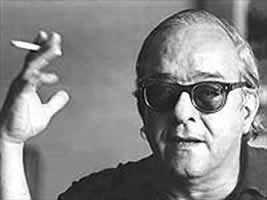As gold breeds misery
Misery breeds light
That makes the stones glare
for the pauper’s delight.
Light is but the pauper’s gold
Stones are but rocks
That pave the way where run
God’s miserable flocks.
The world has many rocks
God has many flocks
God’s a shepherd, I was told
God is made of gold.
Probably a naive author — a child who can be expected to grow out of it, or a populist with a rhyming dictionary. (But maybe this is a trick question, maybe it’s Blake or Dickinson or D.H. Lawrence or Stephen Crane or someone undiscovered sort of like them. Don’t jump too soon. How important is authorship anyway? And who’s that guy in the photo?)
(Answer below the fold)
The Author
Vinícius de Moraes is best known as a bossa nova lyricist and the scriptwriter of Black Orpheus. After a successful career as a literary poet and minor diplomat (a frequent combination in the old days), he got into pop music only in his middle forties when he met Antônio Carlos Jobim: per Wiki, he and Jobim invented bossa nova.*
Archaic, larger-than life public figures of DeMoraes’ sort aren’t seen very much any more, probably not even in Brazil.** Leonard Cohen is a man of letters successful in pop music, and Allen Ginsberg was a poet and a political figure of sorts, and Elizabeth Taylor was married eight times, but de Moraes did all of those things and also had a diplomatic career. (An alcoholic and proud, he once said O uísque é o melhor amigo do homem – é o cão engarrafado — “Whiskey is man’s best friend, a dog in a bottle”).
As for the poem: de Moraes was a man of the world and international traveler who spent considerable time in Hollywood and may have written this poem in English just as a lark, but it probably also accurately expresses his feelings on wealth and poverty, both of which Brazil has in abundance. I personally would be happier if American poets felt freer to write this way (which doesn’t even mean that I think it’s a good poem), but that’s not going to happen.
NOTES
* I don’t really know what the big deal about the author function is, but this definitely seems to be a poem whose interpretation changes when you know who the author is.
** Wiki is interesting, easy, and fun, and after a cursory inspection to screen out the absolute crap, I have no problems with citing Wiki for what it is. Caveat lector, and that goes for everything I write myself too.
*** I am very far from being an expert on Brazilian literature, but I’ve liked some of it and do read Portuguese. The line between literary and pop is apparently less strictly drawn down there, and before 1960 or so Brazil also seems to have been less interested in keeping up with modernist trends — symbolist poetry was still being written into the 1940s .

I think it’s a good poem. Who translated it? Or was it written in English?
Rhyming and repetition in general are so ideologically inflected within contemporary American poetry that it’s hard to avoid pulling some pose in relation to it. The “I’m going to rhyme because I’m in touch with the people, no matter what those langpo or flarf avant-ists say” thing is almost as tiresome as the reverse.
Anyways, I think the “if American poets felt freer to write this way” thing is a bit misdirected. Maybe credentialed, academic poets don’t tend to write this way? I don’t even know, frankly, because I don’t read those magazines, and I don’t really know anyone who does. But the poets who you meet at communal poetry events write in just about every way that poets have ever written.
It was written in English — I’ve clarified that in the text. In its oddness it’s a little reminiscent of Brecht’s lyrics written in English, e.g. “Whiskey Bar”. (But a friend of mine was told long ago that Brecht’s German is as odd as his English.)